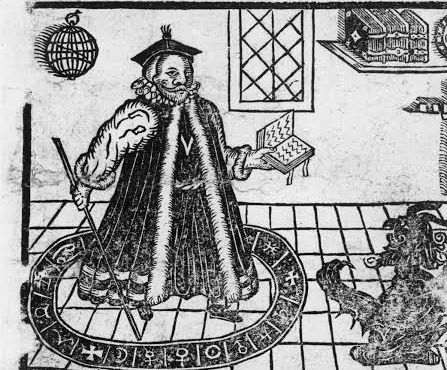ABOUT THE PLAYWRIGHT
Christopher Marlowe was an English playwright born in the year 1564, the same year William Shakespeare was born. During his lifetime, he was a translator, poet and one of the foremost tragedians of Elizabethan era.
Tamburlaine (1590) was his first play performed on a regular stage in London and also was the first English play written in blank verse. He wrote several other plays apart from Tamburlaine. These plays include Hero and the Leander (1598), The Passionate Shepherd (1598), Dr Faustus (1604), Edward II (1594).
His play, The Tragic History of the Life and Death of Doctor Faustus, was one of the most controversial tragedies of the Elizabethan era apart from Shakespeare’s plays. In fact, it is considered important as it is Christopher Marlowe’s greatest play and masterpiece.
Marlowe was murdered by Igram Frizer, who stabbed him in the forehead, in the year 1593.
BACKGROUND OF THE PLAY
The play, The Tragic History of Doctor Faustus by Christopher Marlowe, was published in the year 1604 in the 17th century. Before its publication, it was premiered in 1592 and was first staged in 1593.
The thirteen scene play has Doctor Faustus as its protagonist hero. This fact makes the play an eponymous play. The author is known for writing on characters whose ambitions/behaviours led to their fall. As at the time the play was written, magic was held in high reverence which Christianity frowns at.
The play is all about a German scholar named Faustus who after the fame he had through his traditional forms of knowledge became dissatisfied and decided to practice magic. He got what he craved for from Lucifer by trading his soul with the devil.
The play was written at the time when the use of magic and the possession of magical powers were considered very important as those who possessed these powers were regarded as “gods” in the society and behaved as such. They were always held in high esteem.
From the standpoint of religion, Christianity frowned at the use of magic. This is properly justified in how the “Old Man” advised Dr. Faustus to abstain from magic:
“OLD MAN. Ah, Doctor Faustus, that I might
prevail
To guide thy steps unto the way of life,
By which sweet path thou mayst attain the goal
That shall conduct thee to celestial rest!
Break heart, drop blood, and mingle it with
tears,
Tears falling from repentant heaviness
Of thy most vile and loathsome filthiness,
The stench whereof corrupts the inward soul
With such flagitious crimes of heinous sin
As no commiseration may expel,
But mercy, Faustus, of thy Saviour sweet,
Whose blood alone must wash away thy guilt.”
(Act V, Scene 1)
Another such instance that reflects disapproval of magical arts is the constant persuasion placed on Dr. Faustus by the two Scholars in order to dissuade him from his practice of magic. While magic was treated with reverence as seen in the Palace of the Emperor of Germany and several other instances, it was considered a sin from the religion angle.
SETTING
Places mentioned in this play include: Rhode, where Faustus was born; Wittenberg where he was raised and educated; the Papal Palace where he played magical tricks on the Pope and his subordinates; the Palace of German Emperor where he raised Alexander the Great and his Paramour to satisfy the curiosity of the Emperor of Germany; and Vanholt where he met the duke and his duchess. Also mentioned in the play are Paris, Padua, and Venice.
It is right to say the setting of the play is in Europe, specifically in Germany and Italy around the Elizabethan era in the 16th century.
THE PLOT
(I) The Exposition: We are introduced to Doctor FAUSTUS, a German scholar of high intelligence and vast knowledge and understanding in the field of medicine, law, logic and theology. He is dissatisfied with the secular knowledge he has and craves for magical power. His crave for magic is so strong that he forsakes his scholarly studies and concludes they are impotent.
(II) The Rising Action: The rising action begins when Doctor Faustus instructs Wagner to call to his presence, Valdes and Cornelius. Thus, he consults his two friends who urged him on. FAUSTUS begins his experiment with magical chant and incantations which subsequently summons MEPHISTOPHILIS to his presence. MEPHISTOPHILIS, we learn, is one of devil’s chief ministers. At first Mephistophilis appeared in an awful way, FAUSTUS sends him away for him to reappear in the form of a friar. He then discovers that it is not his conjuration or incantation that has brought MESPHISTOPHILIS to him, rather when one curses divinity or speaks ill of God, devil’s agents will appear.
(III) The Climax: This begins when FAUSTUS enters into a blood contract with Lucifer through MEPHISTOPHILIS. FAUSTUS trades his soul to the devil in exchange for MEPHISTOPHILIS’s service for a period of twenty four years. Here, FAUSTUS asks MEPHISTOPHILIS questions about existence of hell and who created the world. MEPHISTOPHILIS snubs his question on who created the Universe, and confirms the existence of hell. Doubts and confusion starts to set in within FAUSTUS mind. FAUSTUS finds himself in a state of dilemma on what to do and what not to do. He later succumbs to his crave for magic, and binds himself to Lucifer through a second oath.
(IV) The Falling Action: FAUSTUS travels all over the world and performs magical wonders at several places of prominence. He went to the inner chamber of the Pope, the palace of the Emperor of Germany, Duke of Vanholt. We can easily deduce that he travelled to several other places from his soliloquy.
(V) Resolution/Denouement: FAUSTUS, after a whole number of years, discovers that his allotted time of twenty four years was almost over and it dawns on him the reality of hell and damnation. He realizes that he only sold his soul to devil for nothing, and has wasted his magical powers on frivolities. He thinks it was too late for him to change and believes he had sinned beyond redemption that he considered the gravity of his sin as more than that of Adam and Eve.
So, when his hour of damnation clocked, he was dragged into hell by Lucifer and his agents.

THEMES
(A) Thirst for Magic: Faustus has a thirst for magical knowledge, but he is unable to acquire wisdom in the process. His knowledge is subsequently overshadowed by his complete inability to understand certain truths. Because of this weakness, FAUSTUS could not use his knowledge to better himself or his world. He ends his life with a head full of facts, and vital understanding gained too late to save him.
(B) Dilemma: This theme elicits the divided nature of man. Dr. FAUSTUS is constantly undecided about whether to repent or continue to follow his pact with Lucifer. This internal struggle goes on throughout the play as a part of him wants to serve God while the other part of him (perhaps the dominant part) lusts after the power Mephistophilis promises. The good and bad angels, who appear in order to urge him in different directions, symbolise this struggle. While these angels may be intended as an actual pair of supernatural beings, they clearly represent Faustus’s divided will which compels Faustus to commit to MEPHISTOPHILIS but also to question this commitment continually.
(C) Freewill and Fate: The action and damnation of Dr FAUSTUS lingers between freewill and fate. From the standpoint of freewill, Dr FAUSTUS evidently has power over his decisions, and that is properly justified in how he weighs the arguments from both Good Angel and Bad Angel before choosing what his heart binds on him. When we look at this from the viewpoint of fate, Dr FAUSTUS is destined to be sentenced damnation or so it seems. Despite persuasions from various angles [right from Good Angel, the two Scholars to the Old Man], he still ends up doing what he is urged to desist from, which subsequently leads to his downfall.
(D) Pride and Sin: Within the Christian framework, pride is a lethal motivation because it makes the sinner forget his fallen state. Faustus’ first great sin is pride. He does not stop there. Reflecting the Christian view, pride gives rise to all of the other sins and ends ironically with the proud man’s abasement. Faustus is over-pompous and full of hubris in the play. Looking at Faustus’ possession of magic from the Christian perspective, his act is considered a sin.
(E) Blasphemy and Damnation: At the beginning of the play, it is evident that Dr FAUSTUS is blasphemous in his utterances. He speaks ill of God and divinity and places Lucifer above God even when he is conscious of God’s existence and indoctrination of Christianity. His choice of actions later results to his inevitable damnation. In other words, he is condemned to eternal punishment in Hell.
(F) Self-Condemnation: Even before he was finally condemned to eternal damnation, Dr FAUSTUS has already decided his fate. He believes enormity of his sin makes him unredeemable. He even believed that his sin is thus the greatest sin ever committed by humankind.
(G) Wasted Skills: Early in the play before he goes into pact with Lucifer, Faustus is full of ideas for how to use the power he seeks. He aspires to discover the mysteries of Universe and pile a fortune for himself. These ambitions lend a grandeur to Faustus schemes and make his quest for personal power seem almost heroic, a sense that is reinforced by the eloquence of his early soliloquies. When he gains the practically limitless power, however, his horizons seem to narrow. He seems to be contented with performing tricks for the kings and noblemen and transforms his boundless ambition into a meaningless delight in petty celebrity.
LANGUAGE
The play is written in blank verse in Elizabethan English, which is identified linguistically as Early Modern English and is a Germanic language structured from a composition of Anglo, Saxon, Latin, Celtic and Norman influences that reflect the history of England. Many literary devices employed include allusion, digression, simile and metaphor.
THE MOST DRAMATIC SCENE
The most dramatic scene in the play is arguably set at the banquet meeting of the Pope, cardinals, and friars where Dr FAUSTUS and MEPHISTOPHILIS played tricks and teased the former.
COMIC RELIEF
There is no gainsaying that, despite its tragical quality, the play admixes comedy with tragedy. The clown is portrayed as an archetype for comic relief in the play. Digressions made by Dr Faustus at Pope’s banquet and with the House courser reflect comic relief.
 WHATSAPP: Click HERE to join the new Literature PADI WhatsApp group to receive latest updates on your phone and for further literary discussions!
WHATSAPP: Click HERE to join the new Literature PADI WhatsApp group to receive latest updates on your phone and for further literary discussions!







